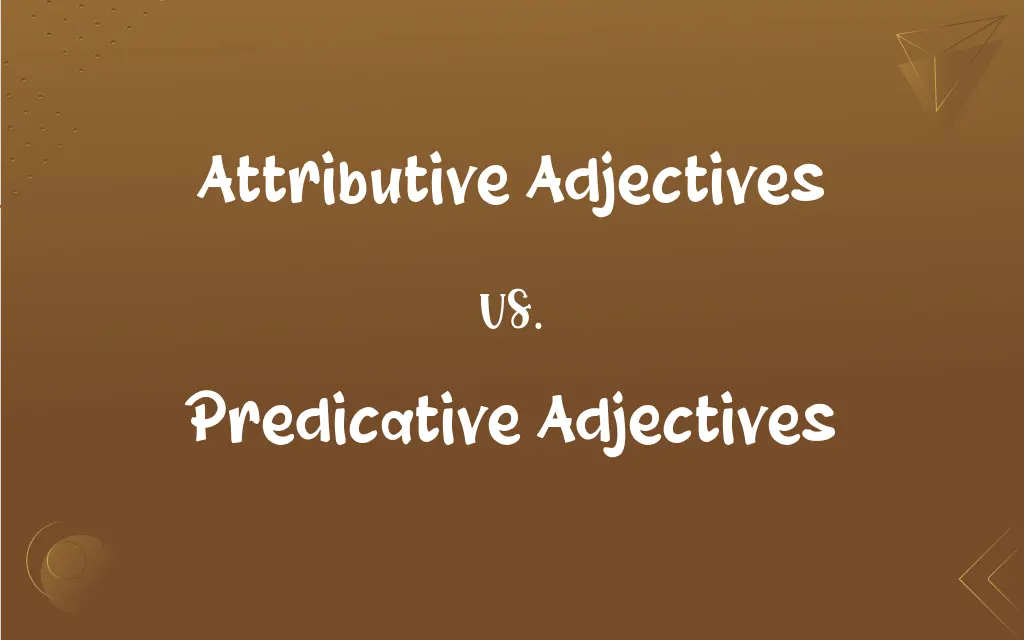Attributive Adjectives vs. Predicative Adjectives: What's the Difference?
Edited by Aimie Carlson || By Harlon Moss || Published on July 15, 2024
Attributive adjectives appear directly before the nouns they modify (e.g., "a red apple"), while predicative adjectives follow a verb and describe the subject (e.g., "the apple is red").

Key Differences
Attributive adjectives and predicative adjectives serve distinct functions in English grammar, helping to modify and clarify nouns. Attributive adjectives are placed directly before a noun within the same noun phrase, providing specific information about the noun's qualities, quantity, or state before any action or state of being is discussed. Predicative adjectives, on the other hand, come after a verb (usually a form of "to be") and serve to describe the subject or object of a sentence. They do not directly precede the noun they modify but are linked to it through a verb, providing information about the noun's state or condition after the verb.
Attributive adjectives are integral in constructing descriptive noun phrases, allowing for the precise and varied description of nouns in sentences. They enrich sentences by directly attaching characteristics to nouns, enhancing the specificity and imagery of the language used. Predicative adjectives play a crucial role in stating or asserting characteristics about the subjects or objects, often forming the predicate part of a sentence and contributing to the sentence's overall meaning and structure.
The use of attributive adjectives allows for immediate, concise description and can affect the interpretation of the noun they modify. Predicative adjectives, by being part of the predicate, often involve a state of being or change, expressing conditions or characteristics that are subject to assessment or variation over time.
Both types of adjectives add detail and depth to sentences, their grammatical positions and roles differ significantly. Attributive adjectives precede nouns and are part of noun phrases, whereas predicative adjectives follow verbs and express the state or qualities of nouns as part of the sentence's predicate.
Comparison Chart
Position in Sentence
Before the noun they modify
After the verb and describe the subject or object
ADVERTISEMENT
Function
Modify nouns directly within noun phrases
Describe the state or condition of nouns through a verb
Relation to Noun
Directly adjacent to the noun
Linked to the noun via a verb
Example Sentences
"A tall building"
"The building is tall"
Usage
For immediate, concise descriptions
For expressing states, conditions, or characteristics
Attributive Adjectives and Predicative Adjectives Definitions
Attributive Adjectives
Attributive adjectives add specific details to nouns.
The ancient ruins fascinated tourists.
ADVERTISEMENT
Predicative Adjectives
Predicative adjectives can indicate change over time.
The street became bright.
Attributive Adjectives
Attributive adjectives precede their nouns.
A small dog barked.
Predicative Adjectives
Predicative adjectives are part of the predicate.
The dog seemed small.
Attributive Adjectives
Attributive adjectives are part of noun phrases.
A cold wind blew.
Predicative Adjectives
Predicative adjectives express conditions or characteristics.
The ruins are ancient.
Attributive Adjectives
Attributive adjectives directly modify nouns.
The noisy crowd dispersed.
Predicative Adjectives
Predicative adjectives follow linking verbs.
The crowd was noisy.
Attributive Adjectives
Attributive adjectives enhance noun imagery.
Bright lights illuminated the street.
Predicative Adjectives
Predicative adjectives describe the subject's state.
The wind is cold.
FAQs
What defines an attributive adjective?
An adjective placed directly before a noun it modifies.
Can all adjectives be used predicatively?
Many can, but not all adjectives fit naturally in a predicative position.
Do predicative adjectives always follow a verb?
Yes, they typically follow linking verbs like "is" or "seems."
What role do predicative adjectives play in a sentence?
They describe the state, condition, or characteristics of nouns after a verb.
What defines a predicative adjective?
An adjective that follows a linking verb and describes the subject or object.
Can the same adjective be both attributive and predicative?
Yes, many adjectives can function in both positions depending on sentence structure.
Are attributive adjectives always adjacent to their nouns?
Yes, they directly precede the noun within the same phrase.
What role do attributive adjectives play in a sentence?
They specify and modify nouns directly, adding detail and clarity.
Can all adjectives be used attributively?
No, some adjectives are exclusively predicative.
Can the position of an adjective change its meaning?
Yes, in some contexts, the position can subtly alter interpretation or emphasis.
Are there grammatical exceptions to these positions?
English has exceptions, but the rules for attributive and predicative positions are generally consistent.
Are there exercises to practice distinguishing between attributive and predicative adjectives?
Yes, many grammar books and online resources offer exercises focused on identifying and correctly using both types of adjectives.
How do predicative adjectives affect sentence meaning?
They convey the state or qualities of nouns, often indicating conditions or changes.
How does context influence the use of attributive and predicative adjectives?
The speaker's intent and the information they wish to convey can determine the adjective's position and function.
Can the misuse of attributive and predicative adjectives lead to ambiguity?
Yes, incorrect placement can confuse the intended meaning or clarity of description.
How does learning about these adjectives benefit language learners?
Understanding their differences improves grammatical accuracy and expressive capability.
How do attributive adjectives affect sentence meaning?
They provide immediate, specific information about nouns, enhancing description.
What is an example of an exclusively predicative adjective?
"Asleep" in "he is asleep" is purely predicative.
How do attributive and predicative adjectives contribute to stylistic choices in writing?
Writers choose between them based on rhythm, emphasis, and clarity desired in their sentences.
What is an example of an exclusively attributive adjective?
"Sheer" in "sheer joy" is often attributive.
About Author
Written by
Harlon MossHarlon is a seasoned quality moderator and accomplished content writer for Difference Wiki. An alumnus of the prestigious University of California, he earned his degree in Computer Science. Leveraging his academic background, Harlon brings a meticulous and informed perspective to his work, ensuring content accuracy and excellence.
Edited by
Aimie CarlsonAimie Carlson, holding a master's degree in English literature, is a fervent English language enthusiast. She lends her writing talents to Difference Wiki, a prominent website that specializes in comparisons, offering readers insightful analyses that both captivate and inform.






































































